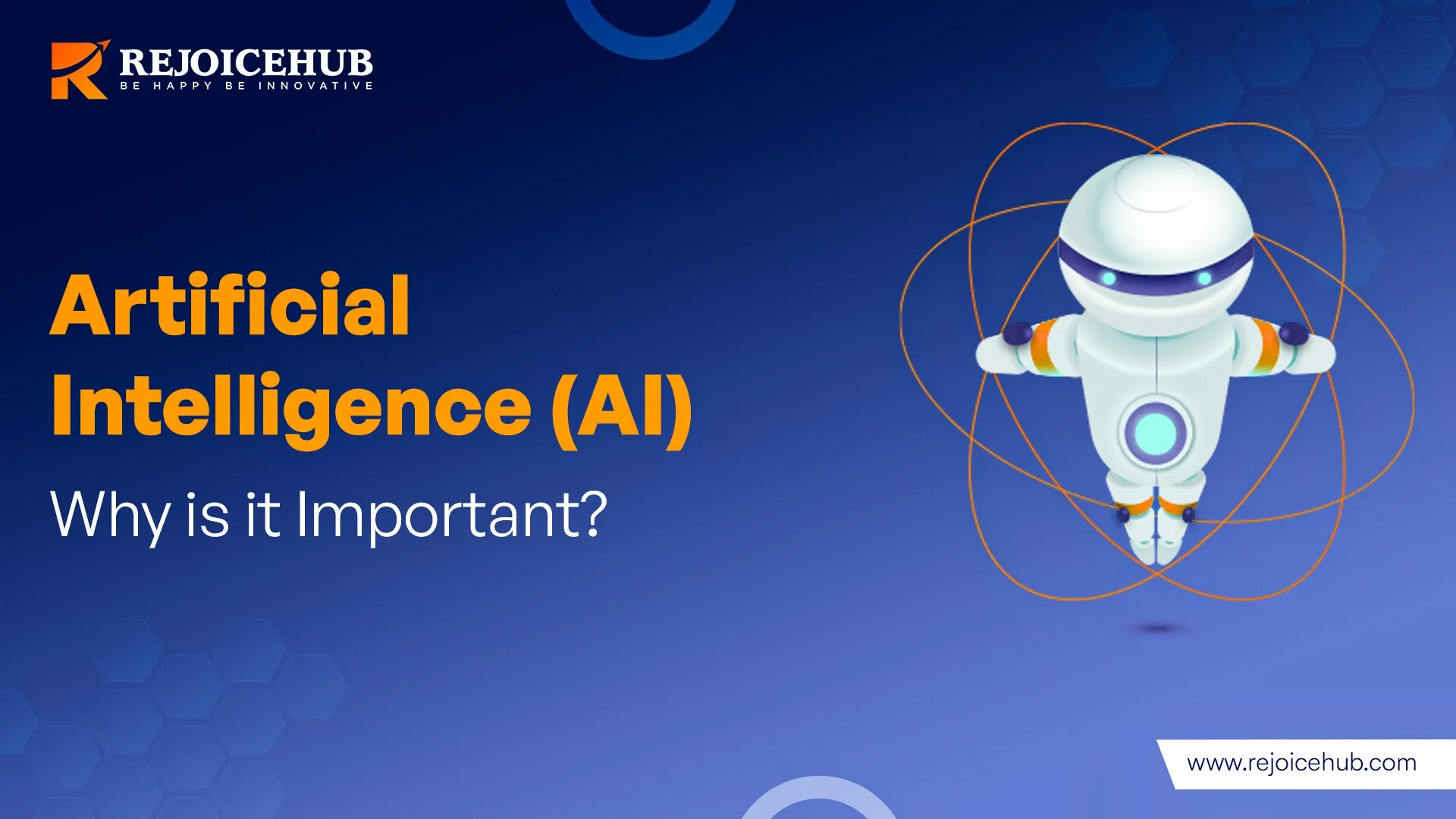 Can you imagine a world without AI?
Can you imagine a world without AI?
If I had asked this question 2 years ago, you would have said, “maybe”, but after the launch of generative AI models, things have changed.
AI has become a part of everyday life.
We use it for writing, coding and even for asking day to day questions.
Because it generates a quick and easy response to everything we ask, and the fact that it can answer follow up questions, it makes it more convenient. a But, do you ever wonder what is the fundamental behind all this technology, and what goes behind training it?
Let's start with what is artificial intelligence and its intricacies!
What is AI?
AI or Artificial intelligence technology is like computer software but a smarter version of it. Because it can think like a human and has intelligence similar to humans.
Unlike regular computer softwares that understands only code, AI is able to understand human language and is able to resolve our queries.
Not just that, it is able to make smarter decisions and learn from experience just like we humans do.
That is why it is called artificial intelligence.
Now that you have understood What is AI technology, let's understand how AI works.
How does AI work?
AI basically functions through algorithms and models. It mostly uses machine learning and deep learning to perform tasks.
It uses a large amount of data to identify patterns and perform certain tasks. It automatically improves overtime with the input it gets. Though it needs to be trained to be adaptive and work in a certain manner.
It uses deep learning, because it mimics human intelligence to process information and respond accordingly.
Why is AI important?
1. Improved Data Processing: AI is trained to analyse large amounts of data and patterns. Humans can do it but the chances of error and the time required is very high. AI can quickly process the data and help humans with the information we need.
2. Task automation: AI helps automate a lot of tasks because it can think like humans and respond to real life situations. Also, with AI automation, humans can focus on more creative and complex work.
3. Driving innovation: With the use of AI, we are now able to solve more complex challenges and push the boundaries. Whether it's healthcare, climate or automation, AI is helping us innovate new things.
4 Types of Artificial Intelligence
Artificial Intelligence (AI) types include Narrow AI for specific tasks, General AI for human-like capabilities, and Superintelligent AI, which surpasses human intelligence in all aspects.
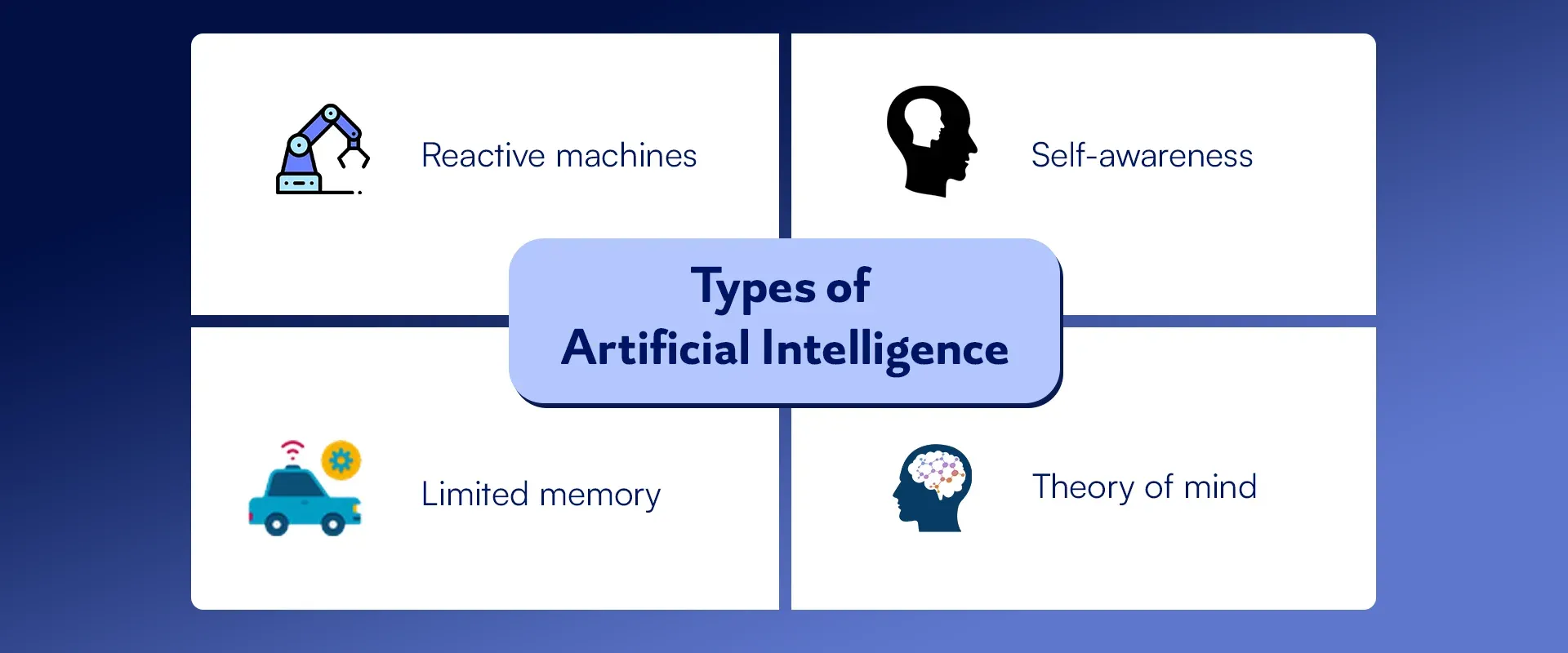
1. Reactive machines
Reactive machines are only algorithms or systems built for pre-programmed tasks. Reactive machines are not able to learn and adapt based on experience.
2. Limited memory
This type of AI uses data from the past to take actions in the present. Most AI’s that we see today fall under this category.
3. Theory of mind
It is currently theoretical and we haven't built anything like this yet. It will be able to understand the emotions of humans and social interactions. And it will make decisions based on what humans need and will respond accordingly.
4. Self-awareness
This is the far future we are talking about. This kind of AI will not need any human intervention. AI will think and automatically take action. It’s like Ultron from the Avengers movie.
The rise of generative models
Generative models are subsets of Artificial intelligence. These include AI chatbots like ChatGPT and Claude.
GPT (Generative Pre-trained Transformer) and GANs (Generative Adversarial Networks) are models that are able to generate stuff just like humans.
AI is mostly generative AI in today’s world. We use it in our day to day lives and it is making things a lot easier for us. As I asked before, we can not imagine a world without AI today. It's because of these models.
It is only getting better because of their increasing capabilities to perform complex tasks.
Also read this article : Artificial Intelligence Companies in India
Artificial intelligence training models
Artificial intelligence training models include supervised, unsupervised, and reinforcement learning, which teach AI systems to recognize patterns, make decisions, and improve performance through data-driven training.
1. Supervised learning
In supervised learning, AI models are trained on datasets that include both inputs and outputs. Remember how ChatGPT has an option to add prompts and the expected output. This is exactly the same.
2. Unsupervised learning
In unsupervised learning, there are no predefined inputs and outputs. AI automatically looks for patterns and other factors based on how similar they are. For example, if you want to segment customers, you can use AI’s trained on these models, because customer segmentation has similarities like age, location and more.
3. Reinforcement learning
This type of learning involves AI learning by trial and error. It gets rewarded for doing things right, and if it fails, it gets penalties. It helps it improvise its decision-making skills over time.
Common types of artificial neural networks
Common types of artificial neural networks include Feedforward, Recurrent (RNN), Convolutional (CNN), and Generative Adversarial Networks (GAN), each designed for specific tasks like pattern recognition and sequence prediction.
-
Feedforward neural networks (FF) Feedforward neural networks are the oldest neural networks. In FF neural networks, data only flows in one direction, from input to output. So it is used in applications like pattern recognition.
-
Recurrent neural networks (RNN) RNNs have loops that allow them to recall the memory of previous data points. It makes them a good choice for tasks that involve sequences like time series prediction or language processing.
-
Long/short term memory (LSTM) LSTM networks are a specialized type of RNN designed to remember information over long periods. It is mostly used in speech recognition.
-
Convolutional neural networks (CNN) CNNs are designed for image processing. It uses convolutional layers to detect patterns such as edges and textures. It makes them effective for tasks like image recognition.
-
Generative adversarial networks (GAN) GANs have two neural networks. One that generates data and another that tries to differentiate between real and fake data. It is often used for creating realistic images, and videos.
Benefits of Artificial Intelligence
Artificial Intelligence benefits include improved efficiency, automation of repetitive tasks, enhanced decision-making, personalized experiences, cost reduction, and advancements in healthcare, education, and various industries.
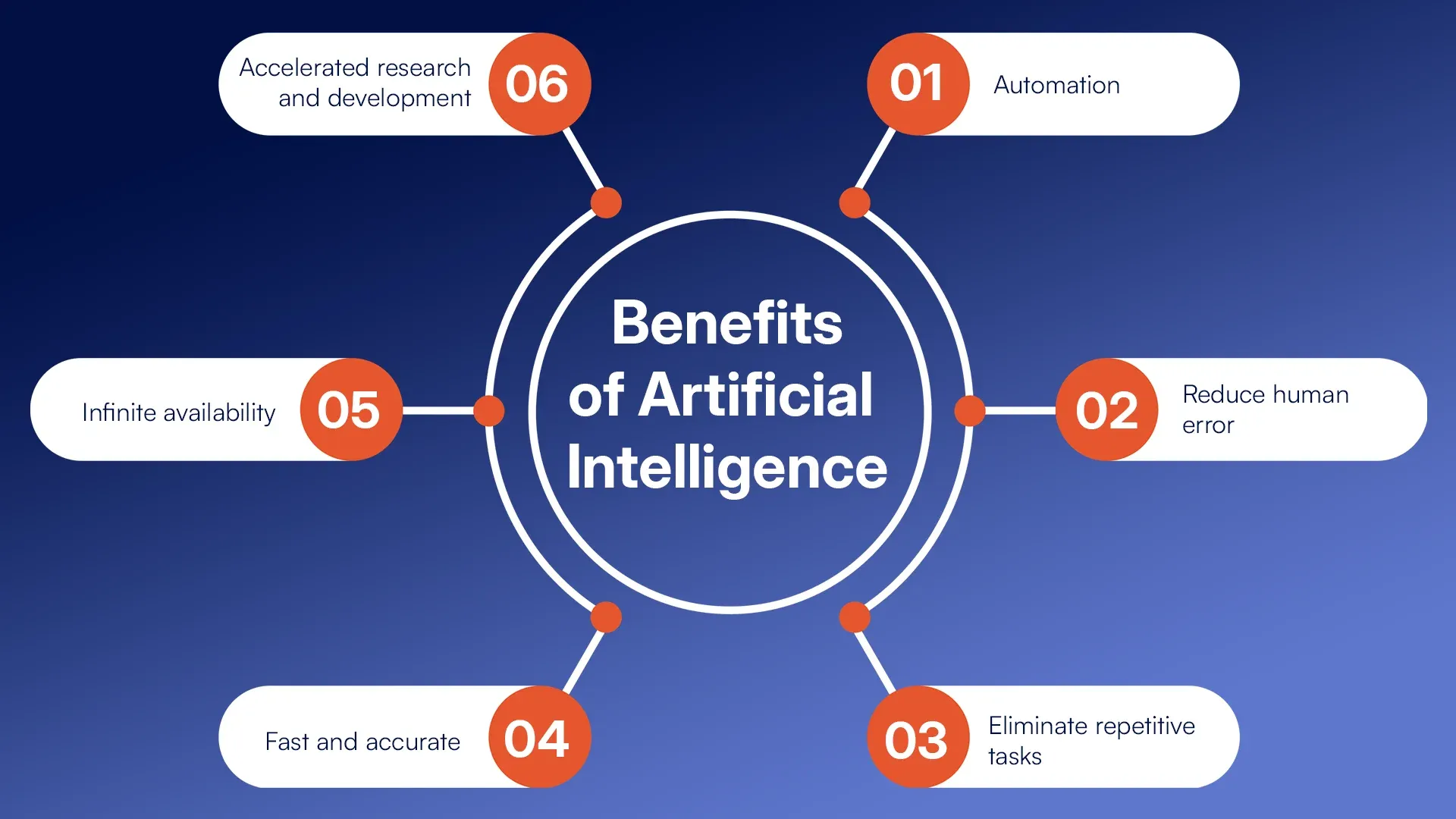
1. Automation
AI can help automate tasks that require human effort. It can perform simple tasks like data entry and complex tasks like managing industrial robots. With AI, businesses can save costs and efforts for performing certain kinds of tasks.
2. Reduce human error
AI uses a specific algorithm and once we train it to do a specific task, it can perform the exact same task without making any mistake. This is not the case in humans, even after learning a specific thing many times, we tend to make mistakes sometimes.
3. Eliminate repetitive tasks
AI handles repetitive tasks like sorting through data or verifying documents. It helps humans focus on more creative and complex tasks.
4. Fast and accurate
AI can easily process large amounts of data quickly with high accuracy. It helps businesses make better predictions and respond to growing demands faster.
5. Infinite availability
AI can work 24X7. Unlike human, artificial intelligence doesn’t require any break. So, AI can work all the time for your business.
6. Accelerated research and development
AI can analyze data and help us with finding patterns in it. It helps us speed up the research and innovate faster.
Applications and use cases for artificial intelligence
Artificial Intelligence applications span healthcare diagnostics, autonomous vehicles, personalized recommendations, virtual assistants, fraud detection, predictive maintenance, and natural language processing in industries like finance, retail, and manufacturing.
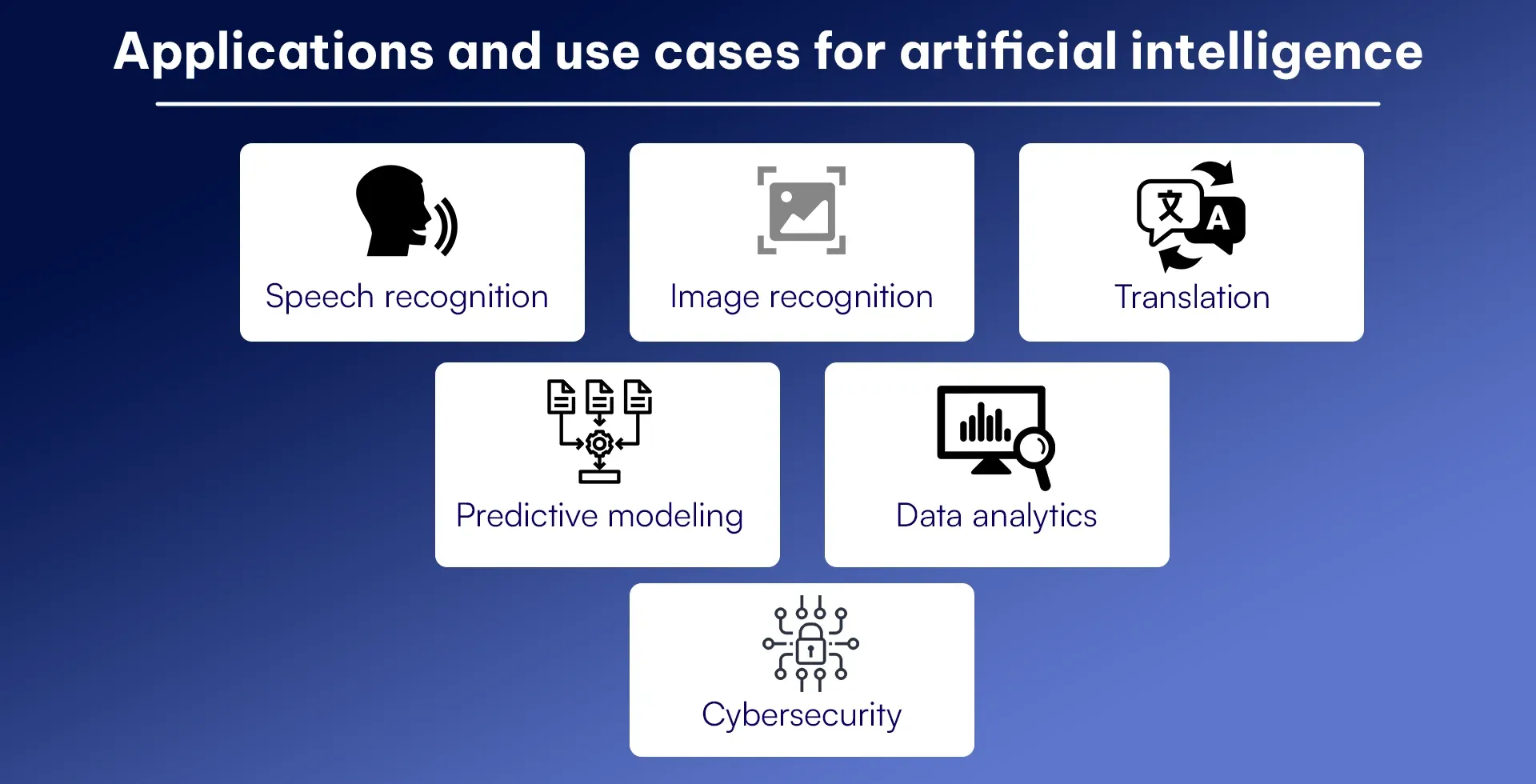
1. Speech recognition
AI helps machines understand the language that we humans speak. It wasn’t possible before AI because machines only understood the binary language. So, with AI, we were able to make virtual assistants like Siri, and Alexa, that can interact with us in our language.
2. Image recognition
AI can easily identify images and objects in images. If you use Google photos, you would know how it segments photos based on people.
3. Translation
We are seeing this in every phone now. We can translate text and speech in real-time with the help of AI. It helps us narrow down the language barriers.
4. Predictive modeling
AI can analyze and predict data more accurately than we ever could. That is why it is used in multiple industries, like finance, healthcare and manufacturing.
5. Data analytics
With AI, we can analyze data better and we can find patterns easily. It helps us get a completely new perspective on how the data should be looked at.
Artificial Intelligence Examples
Examples of Artificial Intelligence include virtual assistants like Siri, autonomous vehicles, facial recognition systems, chatbots, recommendation algorithms on Netflix, and AI-powered medical diagnosis tools.
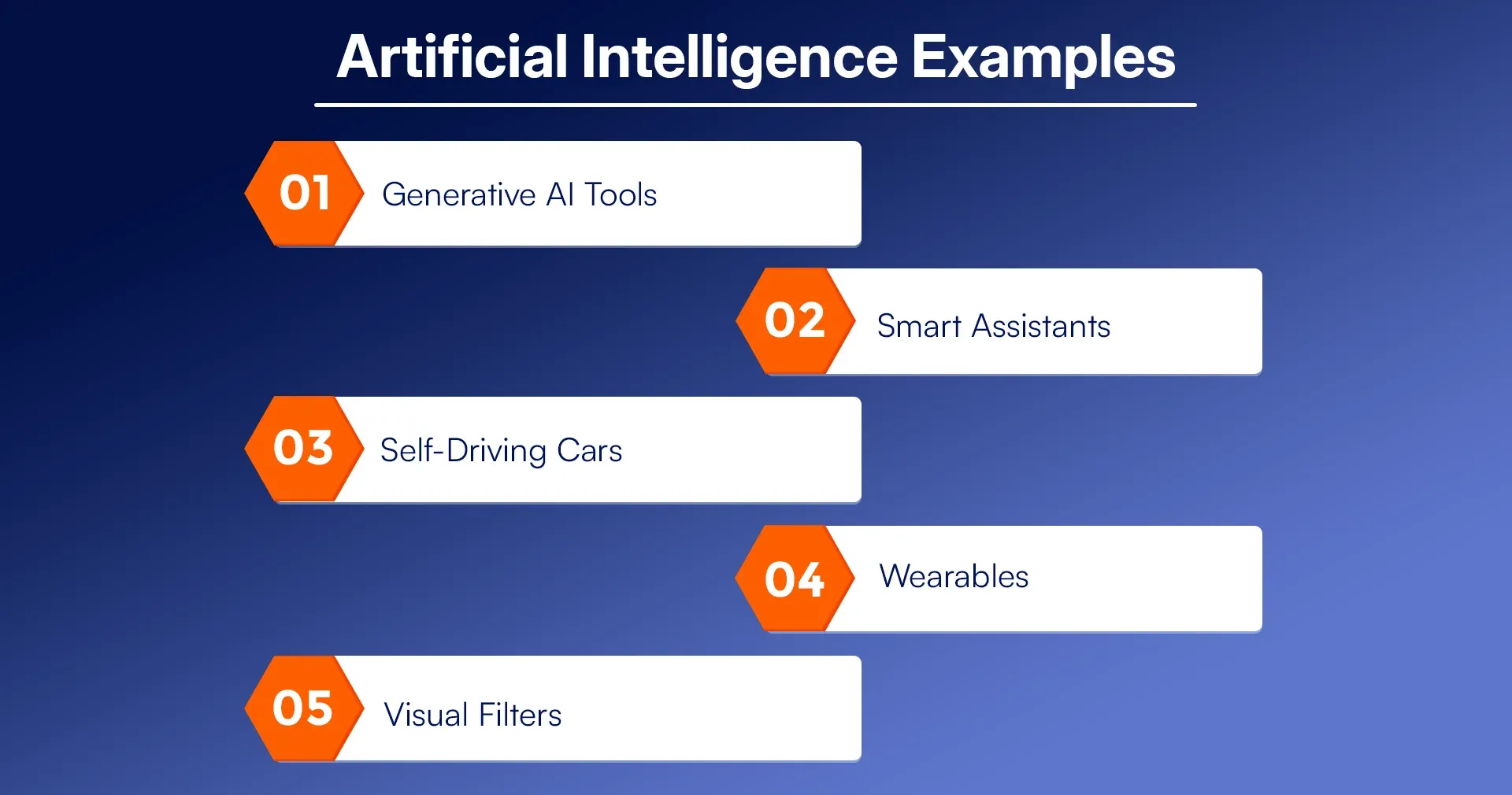
1. Generative AI Tools
Tools like ChatGPT, Gemini, and Claude are examples of generative AI tools. They help us in both our personal and work lives. They can generate email, blog content, code and answer simple queries.
2. Smart Assistants
We are surrounded by smart assistants. We use Siri, Google assistant and Alexa in our day to day life.
3. Self-Driving Cars
Self driving cars use a mix of real time camera feed and AI algorithms to decide when to drive and when to apply brakes.
4. Wearables
Wearables collects a lot of our health data and AI can help us analyze it and provide personalized insights based on our health.
5. Visual Filters
If you use social media, you know how the filters are automatically applied in real-time. It is all AI. Also, AI can help us identify objects based on certain parameters.
Conclusion
With AI, everything is about to get better. We’ll see a lot of automation in the coming decade. We can say that AI is the next big revolution.
If you want to build AI-powered solutions, our team at Rejoicehub LLP can help you. Our team is an expert in building ai services and solutions for different industries.
Whether you want to build something from scratch or want to implement AI in your existing system, our team can help!
Frequently Asked Questions
1. What is artificial intelligence with examples?
Artificial intelligence is like a smart algorithm that can perform tasks automatically without any human intervention. Examples of Artificial intelligence are smart assistants, autonomous cars, and generative AI chatbots.
2. How does AI work?
AI uses algorithms and models to process data and learn from it. It helps it make decisions like humans do
3. How is AI different from generative AI?
AI and generative AI are not different. Generative AI is a subset of AI. AI is a very broad field where machines are designed to mimic human intelligence. On the other hand, generative AI helps with generating text, images and more.